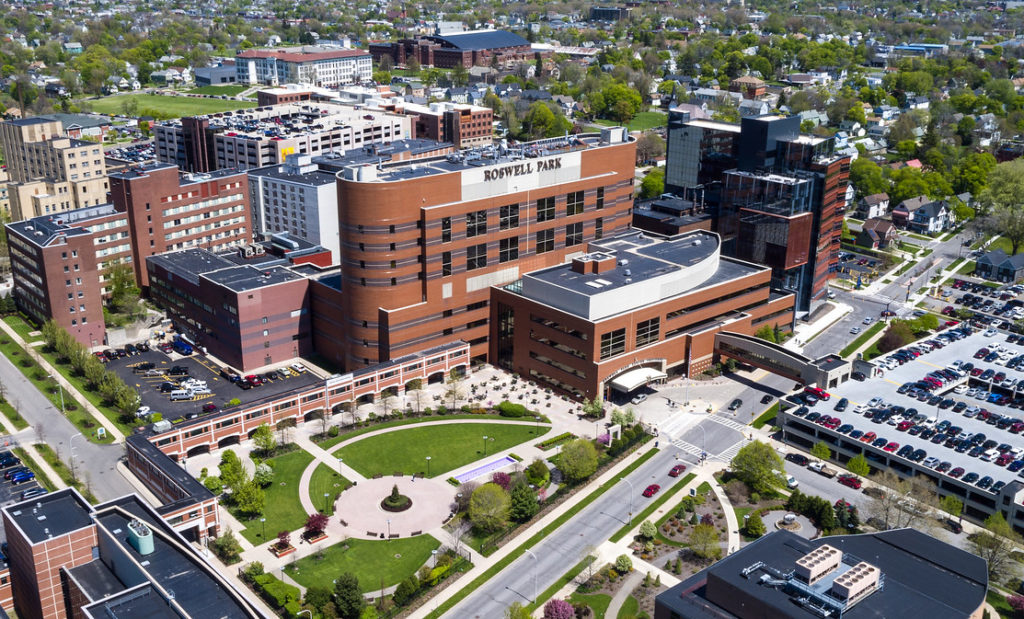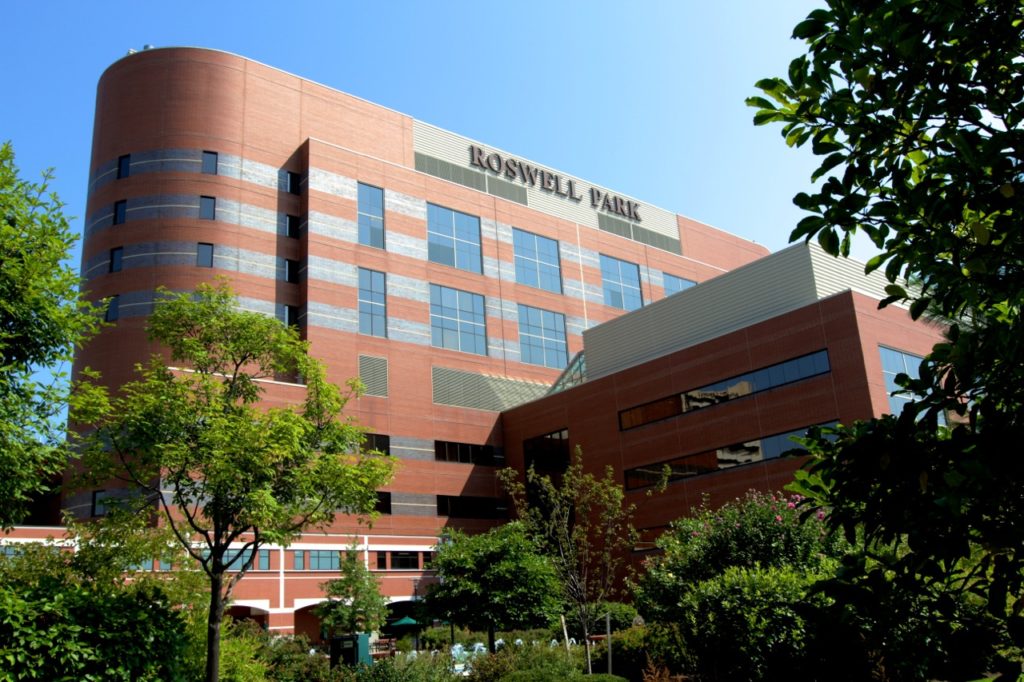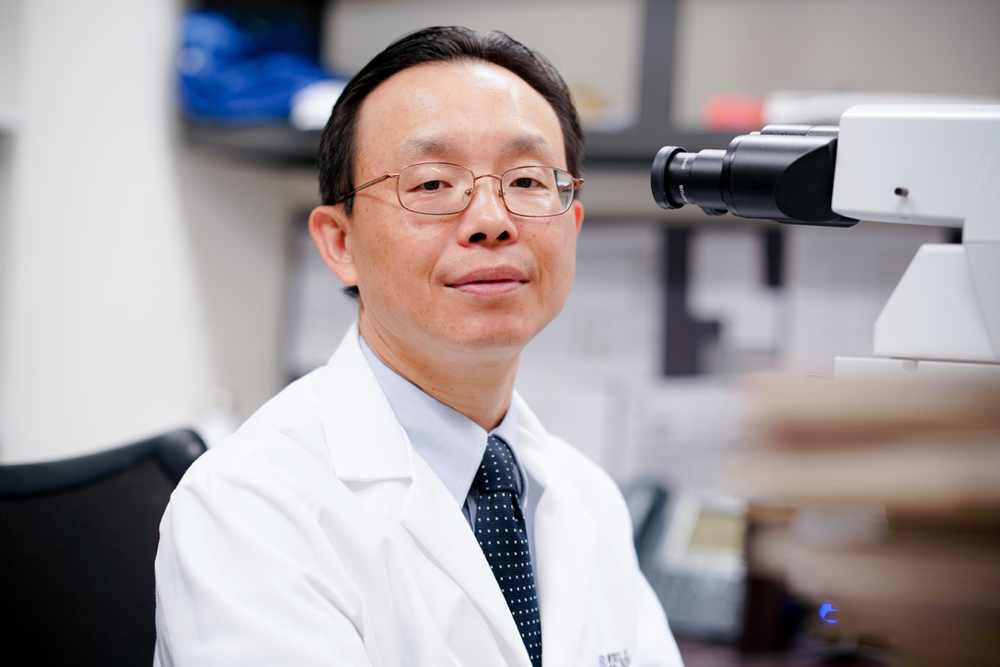Jingxin Qiu, Roswell Park Comprehensive Cancer Center, Buffalo, New York

I’d first like to share a bit of background about our center. Roswell Park Comprehensive Cancer Center
was established by Dr. Roswell Park in 1898 in Buffalo, New York — the first institution in the world to
focus exclusively on cancer research. Over the years, Roswell Park has made many significant
contributions in both cancer research and patient care. The famous RPMI 1640 cell culture medium was
developed at Roswell Park in 1966. In the 1970s, Dr. T. Ming Chu led the work that resulted in the
discovery of PSA, prostate-specific antigen, and the development of the PSA blood test for prostate
cancer. Over the years, others from Roswell Park made pioneering advances in photodynamic therapy
(PDT), development of the 5-FU/leucovorin regimen — for many years the gold standard chemotherapy
for colorectal cancer, robotic cystectomy, and long-term care and follow-up for survivors of childhood
cancer. U.S. News & World Report has ranked Roswell Park 14th among nearly 900 adult cancer
hospitals for the past two years.
When the COVID-19 pandemic hit Buffalo and Western New York this past spring, non-emergent care at
all our local hospitals was largely paused. Roswell Park has remained open and operational throughout
the crisis, but for a period beginning in mid-March and in accordance with mandates from our public
officials, we postponed certain cancer screenings and procedures that could be safely delayed and
pivoted to a virtual visit model for many appointments that could be effectively conducted in this
manner.
By that point, our center leadership had already taken many steps to mobilize for the developing crisis,
including the following:
– Activation of our Incident Command System (ICS) to carry out emergency operations planning
– Implementation of a work-from-home plan and other measures limiting the numbers of people on
campus to those essential for clinical care and core operations
– Constant communication from the ICS team and center leadership to all our internal and external
audiences, including daily emails to employees and numerous resources for patients and the public, all
sharing important updates and conveying key information
– Comprehensive, proactive screening for COVID symptoms/exposures for anyone coming to our campus
– Procedural changes and streamlining across departments; for the Pathology team, this included
updates to our protocols for handling of tissues and specimens from patients with known or suspected
COVID-19
– Reduced staffing based on care priorities and environmental safety across the center
Our Pathology and Laboratory Medicine team quickly made COVID-19 testing available for our patients
and staff, validating and implementing our own FDA-authorized assay within a matter of weeks. Our
approach incorporates multiple testing platforms in order to protect against possible supply chain
disruptions and respond to evolving clinical priorities.
Our department leadership coordinated strategic training of clinical laboratory staff and New York State-
licensed clinical laboratory technologists to maximize the quality and capacity of our testing effort. Our
custom PCR detection assay for SARS-COV-2, in use at our center since late March, has proven to be
highly effective and accurate, and we are consistently producing test results within 6 hours.
Our community and campus have been comparatively fortunate in our overall experience with COVID-
19. The numbers of Roswell Park staff and patients testing positive for the virus have remained very low,
with no evidence that anyone contracted the virus while at our facilities.
I credit continued strong leadership from our ICS team and center leadership for this success, achieved
through a number of effective strategies: continued education and implementation of best practices to
reduce chance of exposure to any pathogens among patients and staff members; swift, concise
communication between Roswell Park supervisors and our Employee Health team, and effective
communication to many audiences across many information platforms; successful contact tracing; and
high levels of employee participation in all emergency practices.
I saw much to be commended from our Pathology and Laboratory Medicine team too: Strong leadership
from senior staff, helping us to maintain a focus on sustainable laboratory practices; strategic planning
by department leadership supporting effective and efficient use of COVID-19 testing; our fast testing
turnaround times, which supported effective infection control.
Our team’s contributions to COVID treatment and research have been significant. Once COVID
convalescent plasma (CCP) from donors previously infected and recovered from COVID-19 was identified
as a potential therapy for patients infected with the virus, Roswell Park enrolled in the Mayo Expanded
Access Program (EAP), serving as an FDA-registered regional resource for collection, manufacture and
distribution of CCP for treatment of patient across our area. Several of my colleagues took a leadership
role in bringing important COVID clinical trials to our region — including new strategies and initiatives
developed at Roswell Park.

Together, these steps increased our patients’ confidence in our ability to keep them safe even during
this global health crisis — and probably saved lives.
Beginning in June, we started to gradually return to pre-COVID levels of activity across the center. While
so much has changed with universal mask-wearing, social distancing and fewer people on campus at any
one time, we are once again fully operational across all areas of our mission.
Our center’s successful management of the many challenges posed by the COVID pandemic proves that
effective preparation and planning as well as communication can make the transitions into and back out
of emergency situations as smooth as possible, minimizing stress and worry for all involved.
14 September 2020

